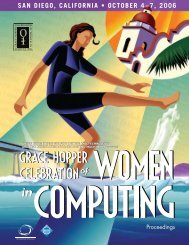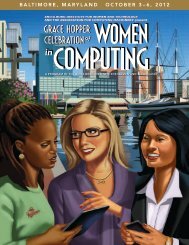ABI-ONE ghc program v14.indd - Grace Hopper Celebration of ...
ABI-ONE ghc program v14.indd - Grace Hopper Celebration of ...
ABI-ONE ghc program v14.indd - Grace Hopper Celebration of ...
You also want an ePaper? Increase the reach of your titles
YUMPU automatically turns print PDFs into web optimized ePapers that Google loves.
9:30-10:30am<br />
PhD Forum 1 –<br />
Bioinformatics<br />
Applications<br />
Location: Regency Ballroom VII<br />
Mentor: Deb Agarwal (Lawrence Berkeley<br />
National Lab)<br />
A Flexible, Scalable Framework for<br />
Integrating Heterogeneous Sequence<br />
Data in Comparative Genomics<br />
Presenter: Allison A. Regier (University <strong>of</strong><br />
Notre Dame)<br />
The assembly step is critical for using<br />
genome sequence data, but it may<br />
introduce errors and/or hide ambiguities.<br />
Previously, the underlying sequence was<br />
discarded because <strong>of</strong> its high computational<br />
demands. I am developing a framework to<br />
efficiently access underlying sequence data<br />
during downstream analysis. The framework<br />
leverages new developments in distributed<br />
computing that make common data access<br />
patterns efficient. We will use this information<br />
to improve comparative genome<br />
analysis.<br />
Multivariate Time Series Analysis <strong>of</strong><br />
Clinical and Physiological Data<br />
Presenter: Patricia Ordóñez Rozo<br />
(University <strong>of</strong> Maryland, Baltimore County)<br />
We aim to create a multivariate<br />
temporal representation <strong>of</strong> electronic<br />
medical data which automates the personalization<br />
<strong>of</strong> baselines and thresholds based<br />
on a patient’s history. Visualizations based<br />
on the representation emphasize the rate<br />
<strong>of</strong> change in variables and assist providers<br />
in analyzing the data from a multivariate<br />
perspective. A novel similarity metric for this<br />
representation will be the cornerstone to the<br />
development <strong>of</strong> a search engine for large<br />
medical databases.<br />
p r O G r a m d e Ta i L<br />
WEDNESDAY | SEPT 29<br />
Multi-Agent Fault Tolerance Inspired by<br />
a Computational Analysis <strong>of</strong> Cancer<br />
Presenter: Megan Olsen (University <strong>of</strong><br />
Massachusetts, Amherst)<br />
In cancer biology, it is known that cancer<br />
cells can disappear without therapy, but<br />
not how. We propose that cells communicate<br />
such that primarily malfunctioning cells<br />
(tumors) die. We also propose that this same<br />
communication can be used as inspiration<br />
for a fault-tolerance mechanism for multiagent<br />
and distributed systems to remove<br />
faulty agents using only local information.<br />
I examine the communication protocols<br />
necessary for removing these faults in both<br />
systems.<br />
PhD Forum 2 –<br />
Architecture<br />
Location: Hanover CDE<br />
Mentor: Patty Lopez (Intel)<br />
Predictor Virtualization: Teaching Old<br />
Caches New Tricks<br />
Presenter: Ioana M. Burcea (University <strong>of</strong><br />
Toronto)<br />
We present Predictor Virtualization (PV),<br />
a technique that takes advantage<br />
<strong>of</strong> the existing memory hierarchy (i.e.,<br />
processor caches and main memory) to<br />
emulate large prediction tables for hardware<br />
optimizations. PV increases the utility <strong>of</strong><br />
traditional caches: in addition to being<br />
accelerators for slow <strong>of</strong>f-chip memories, the<br />
on-chip memory hierarchy becomes leverage<br />
for effective predictor-based hardware<br />
optimizations.<br />
Coordinated System Level Resource<br />
Management for Heterogeneous<br />
Many-Core Platforms<br />
Presenter: Vishakha Gupta (Georgia<br />
Institute <strong>of</strong> Technology)<br />
challenge posed by future architectures<br />
A is the efficient exploitation <strong>of</strong> their many<br />
and sometimes heterogeneous cores. This<br />
is exacerbated by multiple facilities for data<br />
movement and sharing across cores on such<br />
platforms. Our work aims to enable high<br />
performance <strong>program</strong> execution and efficient<br />
resource utilization in such platforms. Hence,<br />
we propose to virtualize platforms to allow<br />
for flexibility in targeting functionality,<br />
schedule VMs efficiently and create underlying<br />
system-level technologies.<br />
Throughput-Driven Optimizations for<br />
Programming Multi-Core Platforms<br />
Presenter: Rebecca Collins (Columbia<br />
University)<br />
Multi-core architectures are ubiquitous<br />
today, and there is a need for<br />
high level <strong>program</strong>ming tools that capture<br />
an application’s parallel substructure<br />
without placing too great a burden on the<br />
<strong>program</strong>mer. My research includes two<br />
domain-specific tools that raise the level <strong>of</strong><br />
<strong>program</strong>ming abstraction while enhancing<br />
system throughput for data-driven applications.<br />
New Investigators<br />
1 – Real World<br />
Applications<br />
Location: Hanover AB<br />
Mentor: Andrea Danyluk (Williams<br />
College)<br />
Hybrid Methods for Generating<br />
and Evaluating Style-Specific<br />
Accompaniment<br />
Presenter: Ching-Hua Chuan (University <strong>of</strong><br />
North Florida)<br />
Creating distinctive harmonizations in an<br />
identifiable style may be one <strong>of</strong> the most<br />
difficult tasks for amateur song writers. To<br />
model and assist in this creative process, we<br />
present a hybrid computer system combining<br />
knowledge <strong>of</strong> musical theory and statistical<br />
learning. The system is capable <strong>of</strong> learning<br />
a style from only a few examples to create<br />
Anita Borg Institute for Women and Technology | <strong>Grace</strong> <strong>Hopper</strong> <strong>Celebration</strong> <strong>of</strong> Women in Computing 17




